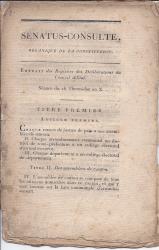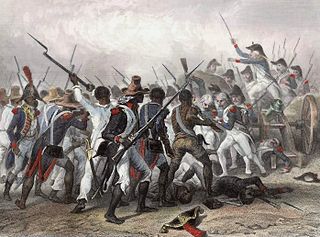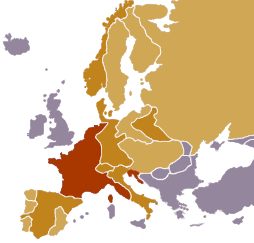 W
WA referendum ratifying the new constitution of the Consulate, which made Napoleon Bonaparte First Consul for life, was held on 10 May 1802. The official result showed 99.76% of voters in favour of the change. Of seven million eligible voters, 49.45% abstained.
 W
WThe Treaty of Amiens temporarily ended hostilities between France and Great Britain during the French Revolutionary Wars. It marked the end of the French Revolutionary Wars; after a short peace it set the stage for the Napoleonic Wars. Britain gave up most of its recent conquests; France was to evacuate Naples and Egypt. Britain retained Ceylon and Trinidad. It was signed in the city of Amiens on 27 March 1802 by Joseph Bonaparte and Marquess Cornwallis as a "Definitive Treaty of Peace." The consequent peace lasted only one year and was the only period of general peace in Europe between 1793 and 1814.
 W
WThe Cisrhenian Republic was a client state of the French Revolutionary Wars. It was proclaimed in 1797 on the Left Bank of the Rhine under French occupation.
 W
WThe Constitution of the Year X was a national constitution of France adopted during the Year X (10) on 16 Thermidor of the French Revolutionary Calendar. It amended the Constitution of the Year VIII, revising the Consulate to augment Napoleon Bonaparte's authority by making him First Consul for Life.
 W
WThe Consulte de Lyon or consulte de la république cisalpine was an extraordinary meeting in the former chapel of the Jesuit college of the Trinity in Lyon during the French Consulate. It was held from 11–26 January 1802 and converted the Cisalpine Republic into the Italian Republic, with Napoleon Bonaparte as its president.
 W
WThe Battle of Crête-à-Pierrot was a major battle of the Haitian Revolution that took place from 4 March until 24 March 1802.
 W
WThe French Law of 20 May 1802 was passed that day, revoking the Law of 4 February 1794 which had abolished slavery in all the French colonies. However, the 1794 decree was only implemented in Saint-Domingue, Guadeloupe and Guyane, and was a dead letter in Senegal, Mauritius, Reunion and Martinique, the last of which had been conquered by the British and thus was unaffected by the 1794 French abolition law.
 W
WThe Organic Articles was a law administering public worship in France.